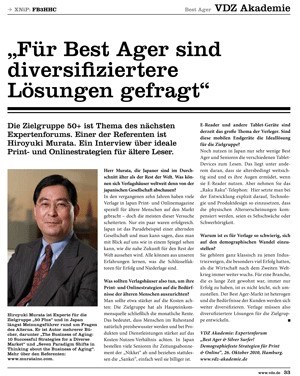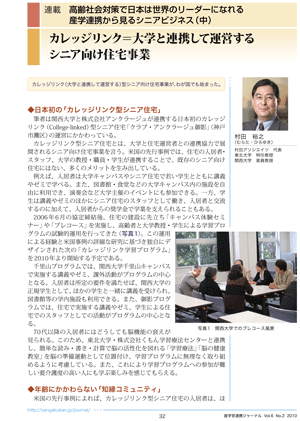Print and More 10月号 インタビュー
日本は高齢社会の「生きた実験室」であり「ショーケース」
ドイツのパブリッシング業界の経営トップが集まるVDZ Akademieが発行するPrint and moreの特集インタビューにに日本のシニア読者に関する村田のインタビュー記事が掲載されました。原文はドイツ語なので、以下に英語訳を掲載します。
なお、この雑誌は10月26日にドイツ・ハンブルグで開催のBest Ager & Silver Surfer! Demographiefeste Strategien fur Print & Onlineの特集号となっており、村田が基調講演者として登壇します。
村田への質問と回答(英訳)
Question: According to the age of the population, Japan is “older” than any other country in the world. By 2030, the government forecasts that people aged over 65 will number about 35 million, or a third of the projected population, the highest percentage in the industrialized world. Once you noted, that Japan is a ”living laboratory“ for the rest of the world, what could publishing houses learn from this ”living laboratory“?
Murata: In the past ten years in Japan, many publishing houses had launched magazines by paper and online targeting Baby Boomers or seniors. The market seemed the garden covered with all sorts of flowers. However, most of the trials were failure. Only a few have been successful. Japan is “showcase of aging society” and you can see us as “mirror reflecting your near future.” You can learn lessons from our experiences; what are the key factors for success and failure.
Question: What should Media Houses do, to adjust their print and online strategies to suit the needs of seniors? (Maybe you could give an example)
Murata: One consideration should be more increase of cost performance. People after retirement depend on pension or social security as main income source. This means that they become more price-sensitive and demand for cost performance to the goods and services. In Japan, many retirees change their newspaper subscription from Nikkei to Sankei because of its lower price. When they were business person, they buy independent books easily; however, they don’t after retirement because they feel expensive.
Question: Regarding media consumption, which are the specific needs of the “best ager” generation?
Murata: While they are independent: health (physical exercise, disease prevention), wealth (saving for the future, retirement planning, housing), and work (make a living or keeping social bonds or finding purpose of life)
While they are no more independent; health, wealth, and care (retirement community, assistive living, nursing home)
Question: What are the biggest misconceptions of companies reaching the elderly?
Murata: In Japan, in the past decade, an increasing number of enterprises have been focusing on developing new products and services for the seniors or Baby Boomer generation. In most cases, these efforts failed. Many providers consider the senior market or the Boomer market as single homogeneous icebergs. However, in a modern economy, it is not enough to say that the Boomers represent a large part of the market just by sheer numbers. The reason is that the nature of today’s market is different from that in the past.
Question: Why is it so difficult for publishing houses to adapt themselves to changing demographics?
Murata: Publishing houses are typical traditional industry which enjoyed huge success when the economy continued to grow after WWII. It is not easy for those who have long-term success experience as “dilemma of success” to change its nature by themselves. The nature of the Best Ager market is “diverse market” where the demand of customers continues to be diversified. Publishing houses must provide more diverse solutions for customers.
Question: NTT DoCoMo started a range of easy-to-use Raku Raku mobile phones, with big buttons and displays, read-aloud features and even a pedometer. E-readers and tablets are a big topic for publishers nowadays, are these devices the ?killer application“ to target the senior market?
Murata: In Japan, both senior and Best Ager customer who use E-readers and tablets for reading books are very few yet. This is because some have farsightedness due to old age and some don’t like to use E-readers since they feel tired on their eyes. Raku-Raku Phone is developed to compensate physical change such as farsightedness and hard of hearing due to the aging by IT technologies and product design. Raku-Raku Phone is not developed for reading books.





